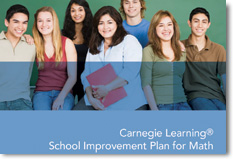Empirical Education Partners with Carnegie Learning on New Student Performance Guarantee

Schools looking to improve student Algebra and Geometry achievement have signed up for a guarantee from Carnegie Learning® that states that students using the company’s Cognitive Tutor programs will pass their math courses. Empirical Education is tasked to monitor student performance in participating schools. Starting this school year, Carnegie Learning guarantees that students who take three complete and consecutive years of Carnegie Learning’s math courses will pass their math class in the third year. The guarantee applies to middle and high school students taking the Carnegie Learning Bridge to Algebra, Algebra, Algebra II, and Geometry courses.
In the coming weeks/months, Empirical will collect roster data, course grades, and assessment scores from schools as well as usage data from Carnegie Learning’s math teaching software. These data will be combined to generate biannual reports that will provide schools with evidence they can use to effectively improve implementation of the courses and raise student achievement.
Carnegie Learning’s guarantee is part of their School Improvement Grant support efforts. “Partnering with Empirical Education will allow us to get mid- and end-of-year research reports into the hands of our school partners,” says Steve Ritter, Co-Founder and Chief Scientist at Carnegie Learning. “It’s part of our continuous improvement cycle; we’re excited to see the progress districts committed to the turnaround and transformation process can make with these new, powerful tools.”

